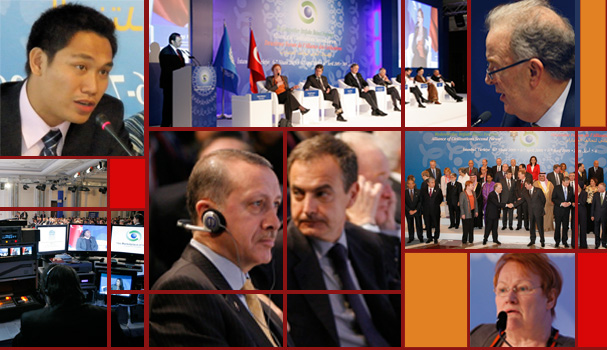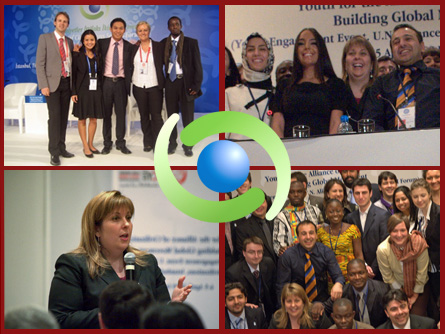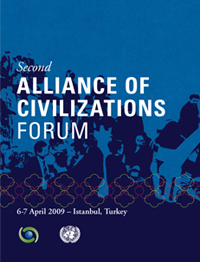On 6-7 April 2009, the Second Global Forum of the United Nations Alliance of Civilizations was held in Istanbul, Turkey. UNAOC’s Global Forum is the world’s premier event aimed at advancing intercultural understanding.

Overview:
“The Alliance Forum is not only about dialogue. It is about dialogue that delivers. It is about concrete, practical projects that make a real difference to the lives of people on the ground”
-President Jorge Sampaio
The Second Forum of the Alliance of Civilizations mobilized the energy, imagination and ideas of a wide range of committed partners, from international organizations to media, from governments to civil society, and from religious leaders to youth. From 6-7 April 2009, over 1,000 participants – among them several Heads of Government, over 50 Ministers, as well as policy-makers, foundation, media and grassroots leaders from around the world – convened at the Ciragan Palace Hotel in Istanbul Turkey, to forge new partnerships and generate ideas aimed at building trust and cooperation among diverse communities. The Forum also served as an opportunity to take stock of initiatives developed by the Alliance of Civilizations and to launch practical projects in collaboration with civil society and corporate partners.
Outcomes:
Second Alliance of Civilizations Forum Report
The Group of Friends at the Istanbul Forum
The Alliance of Civilizations is supported by a growing community of over 100 countries and international organizations known as the Group of Friends.
Since the First Global Forum of the Alliance of Civilizations, this network has expanded by 20%, enriching the work of the Alliance by providing ideas, insights and financial support. Members of the Group of Friends have also created their own National Plans to advance the goals of the Alliance. A range of practical initiatives aimed at creating trust and promoting mutual understanding across cultures have already been launched.
In Istanbul, National Plans to advance the objectives of the Alliance were announced by the following countries: Albania, Algeria, Argentina, Brazil, Montenegro, Portugal, Romania, Russian Federation, Qatar and Slovenia. Bulgaria, New Zealand, Spain, Turkey and the United Kingdom have already adopted National Plans.
Regional Strategies for East-European countries, the Euro-Mediterranean region and the Ibero-American countries have also been announced.
In addition, the Alliance has signed agreements with seven international organizations, with a view to leverage networks and competitive advantage with its partners. The seven agreements have been signed with: the International Organization of Migration, the Organization of the Islamic Conference, the Ibero-American General Secretariat, the Anna Lindh Foundation, l’Organisation de la Francophonie, the Community of Portuguese Speaking Countries and the Union Latine.
Projects at the Istanbul Forum:
A wide range of exciting Alliance projects, new and established, were launched or presented at the Istanbul Forum.
Alliance Fellowship Program
Launched at the Istanbul Forum, the Alliance Fellowship program facilitates mutual, substantive, and meaningful exposure for emerging leaders from North America, Europe, and Muslim-majority countries to media, culture, politics, institutions, civil society, and religion in each other’s countries. It provides a unique opportunity for emerging leaders to learn about other societies, institutions, beliefs and people. It also aims to create an informal network of emerging and influential leaders who will bring fresh perspectives to relations between the different countries and regions and who will advocate for new approaches.
Silatech
Silatech is an initiative of Her Highness Sheikha Mozah bint Nasser Al- Missned, and addresses the critical and growing need to generate jobs and economic opportunities for young people. The initiative promotes large-scale job creation, entrepreneurship, and access to capital and markets for young people, initially in the Arab world, where the highest rate of youth unemployment exists globally. In Istanbul, details of Silatech’s progress since becoming fully operational were announced, including the alliances that it has established with global, regional and international partners to promote job creation, enterprise development, and job placement. Finally, Silatech’s 2009 Doha Summit, to be held on June 8th, 2009, was announced.
Dialogue Café
In collaboration with the Alliance of Civilizations, CISCO launched Dialogue Café at the Istanbul Forum. The project is based on a radical but simple idea: ordinary people have more in common than not and given the opportunity will explore their common interests even across radical geo-political divides. Dialogue Café links diverse groups of citizens from around the world through third generation video-conferencing technology, thereby creating a new space for social innovation and exponentially expanding our ability to solve problems and innovate as a global community. Dialogue Café’s development is being supported by an international multi-sector consortium of partners, enabled by cutting-edge technology, and most importantly is driven by ordinary people. The Café proof of concept will commmence with preparations for pilot cafes in New York, London, Istanbul and the Middle East.
Rapid Response Media Mechanism
The RRMM project concluded a number of partnerships in Istanbul with key organizations including the Anna Lindh Foundation, the European Commission, Search for Common Ground, Gallup, and the International Center for Journalists. An announcement to collaboratively launch a Rapid Response Media Mechanism for the Euro-Mediterranean region with the European Commission and the Anna Lindh Foundation was made. In January 2009, following a bid UNAOC submitted to the UK government for funding to support the development of RRMM, a letter stating a commitment to support RRMM for a major expansion over a period of three years was received.
Restore Trust, Rebuild Bridges
This cluster of projects was jointly developed by the Alliance and partner organizations in the wake of the war in Gaza. This initiative followed a meeting co-organized by the Anna Lindh Foundation and the Alliance of Civilizations in February 2009, aimed at assessing the impact of the war in Gaza on relations among and within societies in the Euro-Mediterranean region. A series of joint actions were agreed upon in order to help restore trust in Euro-Mediterranean dialogue and rebuild human and cultural bridges among societies in the region. In addition to the creation of a regional strategy, this initiative will provide a cluster of projects, including a media-oriented rapid response mechanism to intercultural crises in the Euro-Mediterranean region (AoC, Anna Lindh Foundation and the European Commission); a series of international seminars on the dialogue among civilizations of the Mediterranean presented by the Mediterranean Universities Union (UNIMED); a workshop on conflict transformation for intercultural dialogue and overcoming hatred, as well as a peace camp (Council of Europe); a seminar on Jerusalem as a city of coexistence between monotheistic religions with participants coming from both shores of the Mediterranean (OIC); a training activity in capacity building addressed to Palestinian civil society institutions working in the fields of youth and culture (OIC); and an Intercultural Vade-mecum (UNESCO).
PLURAL+
In Istanbul, the Alliance, in collaboration with the International Organization for Migration (IOM), launched PLURAL +, a youth-produced video festival on migration, inclusiveness, identity and diversity. PLURAL+ will invite young people from across the world are invited to participate by sending videos expressing their opinions and visions relevant to these themes. PLURAL + is being developed with the support of a number of organizations, among them the BaKa Forum, Chinh India and the Anna Lindh Foundation. A selection committee composed of youth and experts from the media, migration and development sectors would identify the top finalists for each of the awards categories and age groups, with final winners in each of the categories being reviewed and identified by a special jury from the youth, media, migration, and development sectors.
Education about Religions and Beliefs
Launched in Istanbul, the Education about Religions and Beliefs (ERB) Clearinghouse chronicles resources for learning about the world’s diverse religions and beliefs as also ethics education, tolerance education, and civic education. The clearinghouse will feature resources including best practices and learning and teaching materials, links to relevant organizations, a journal, events listings, a forum and news.
Alliance Research Network
The Alliance Research Network is a group of institutions that will serve as a collective think-tank for the Alliance and be the leaders of a movement to encourage cross-cultural educational exchange. The network was launched at the Istanbul forum and brings together institutions from around the world who have interests in the Alliance’s four focus areas of education, media, migration, and youth, along with other topics such as cross-cultural understanding, good governance of cultural diversity, and conflict resolution such as women and peacemaking, and city diplomacy. The Research Network will also provide a base of experts to form the “communities of knowledge” in different areas of interest to the Alliance.
International Network of Foundations
The International Network of Foundations is a group of international foundation focusing on four areas intercultural and inter-religious dialogue, education and translation, arts and media, and the engagement of religious leaders in peace building efforts. During the Istanbul Forum, a special session on the network of foundations was used to outline its priority activities moving forward, including knowledge exchange, information sharing and dissemination in the four focus areas; operational support with a view to developing tools that help identify projects and partners and build capacity; identification of collaborative opportunities; and advocacy and contributing to public policy.
Alliance of Civilizations Media Fund
The Alliance Media Fund expands the production of entertaining film, television, and new media content that challenges common stereotypes and exposes audiences to more-balanced representations of regions and cultures that are often ignored or negatively portrayed in mass media. In Istanbul, the Media Fund unveiled its three part strategy, which includes conducting research to increase understanding of the impact of media on attitudes and behavior through a research project at Harvard University, MIT, and the New School University; raising awareness on the research findings through a global media-industry-targeted campaign to garner additional support of media industry leaders for the Media Fund; and producing and distributing content in film, television, and new media that promote greater cross-cultural understanding.
Mapping Media Education Policies in the World: Visions, Programmes and Challenges
The Alliance of Civilizations launched a unique publication to help create a generation of informed media consumers capable of navigating their way in the complex and often polarized world of news and current affairs. Developed in partnership with UNESCO, Grupo Comunicar and the European Commission, ‘Mapping Media Education Policies in the World: Visions, Programmes and Challenges’ offers the insights of eighteen international experts who, through their in-depth analysis, can help shape policies on media literacy and provide citizens with the tools they need to make sense of the sometimes overwhelming flow of daily news and information. “The purpose of this collection is to map some of the most relevant practices that exist at regional level and to highlight the underlying educational and media cultures that support them”, writes Divina Frau-Meigs, co-editor of the book.
Click here to read a digital copy of ‘Mapping Media Education Policies in the World: Visions, Programmes and Challenges’
Doing Business in a Multicultural World: Challenges and Opportunities
The Alliance launched a publication on the innovative role played by the business sector in managing cross-cultural diversity issues in the workplace, and across communities. Developed jointly with the UN Global Compact, the report, entitled ‘Doing Business in a Multicultural World: Challenges and Opportunities’, explores the cross-cultural challenges companies are facing, highlights good practices and lessons learned and illustrates why and how business can play a vital role in fostering intercultural understanding.
Youth at the Istanbul Forum:
Reflecting the status of youth issues as a core area of focus for the Alliance of Civilizations, a number of major sessions at the Istanbul Forum were dedicated to young people and substantive debates about the challenges facing them in promoting intercultural dialogue.

Youth Event:
With a view to ensuring that youth participation into the second Alliance of Civilizations Forum had a strong impact on discussions and outcomes, close to 100 youth from all over the world gathered in Istanbul for two days in preparation for this event. Delegates taking part in the Youth Event:
• Provided input on the United nations Alliance of Civilizations Youth Strategy which includes several UNAOC-led initiatives aiming to mainstream the voice of youth into policies, programs and initiatives seeking to foster understanding among people from different cultures and religions. More precisely, the Youth Strategy focuses on 3 mutually-reinforcing objectives, i.e. raising awareness, strengthening capacity and sharing information.
• Built a Global Youth Movement for the Alliance of Civilizations supporting the efforts of UNAOC and its youth partners. The objective of this movement is to mobilize youth organizations and individuals in order to strengthen commitment to UNAOC principles, foster dialogue as well as highlight concrete actions advancing cross-cultural understanding.
• Developed framework for the Youth Advisory Committee which will work with UNAOC on the implementation and evaluation of its Youth Strategy and help coordinate the Global Youth Movement for the Alliance of Civilizations along with the regional youth platforms.
• Prepared concrete recommendations for all Forum participants. These concrete recommendations were delivered as part of the Forum Opening Ceremony. Click here to view these recommendations [PDF].
Working Session: Youth: Key Actors and Stakeholders in Advancing Cross-Cultural Understanding and Dialogue
This Working Session focused on the rationale and methods for youth participation in advancing cross-cultural understanding. It was recognized that supporting young peoples’ participation in decision-making regarding cross-cultural understanding benefits society as a whole. Panelists explained that young people are active agents of positive change, especially with regard to shaping a society’s response to cultural and religious diversity.
However, it was felt that much remained to be done in order to reach systematic and meaningful participation from a critical mass of diverse youth. To that end, panelists shared various methods and approaches (e.g. co-management, youth caucus, etc) available to international organizations, governments and civil society for them to fully leverage and harness the role that young people play in leading social change.
Breakfast Session: The Youth Solidarity Fund: Celebrating Young Bridge-Builders
The Youth Solidarity Fund provides seed funding to outstanding youth-led initiatives that promote long-term constructive relationships between young people from diverse cultural and religious backgrounds.
This Breakfast Session provided the following youth organizations with the opportunity to present an overview of the results achieved as part of their YSF-supported projects:
• The Role of Youth as Citizens in the Construction of an Intercultural Society (Argentinean Youth Organization for the United Nations, Argentina)
• God and Me (No Ghetto / Respect, France)
• Capacity Building for Youth Leaders of Religious and Traditional Groups on Tolerance and Cultural Diversity for Sustained Peace and Development (Federation of Youth Clubs, Ghana)
• Capacity Building for Youth Leaders and Strengthening Youth Networking for Peace Building (Generation Peace Youth Network, Philippines)
• Interethnic Youth Alliance (Cultural Center DamaD, Serbia)
• Speaking and Listening with Respect: Students, Faith, and Dialogue (International Movement of Catholic Students, International)

